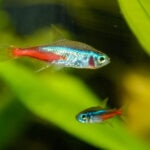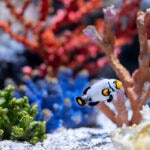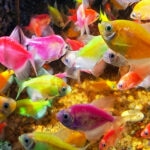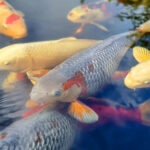Freshwater Velvet Disease
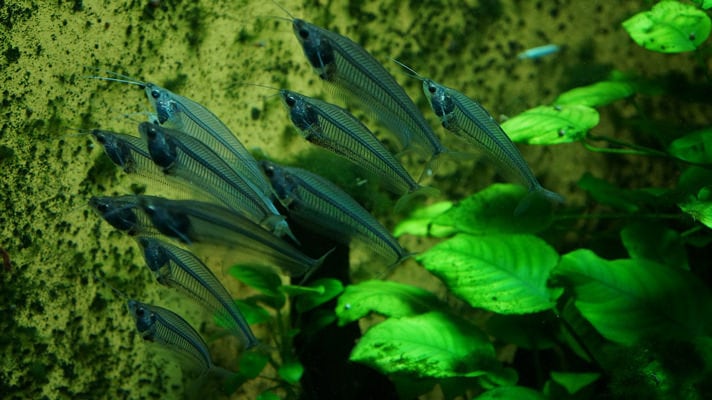
Photo by Chewy
Freshwater velvet, also known as gold dust disease, is one of the most common parasitic infections found in aquarium fish.
Identification
Like freshwater ich (aquarium whitespot), freshwater velvet parasites form cysts on the surface of aquarium fish, but these are smaller than those of freshwater ich and are visible as a metallic or velvety sheen rather than discrete white spots. Freshwater velvet disease is also known as gold dust disease because this sheen often has a golden appearance caused by the photosynthetic pigments inside the parasites.
Another difference between freshwater velvet disease and freshwater ich is the tendency of the velvet parasites to infect the gill membranes of the fish before the skin or fins. Affected aquarium fish rub themselves against solid objects, a behavior aquarists call “flashing.” This is often the first sign of freshwater velvet disease. Such infections make breathing difficult, causing aquarium fish to ventilate their gills more rapidly than normal.
Aquarium fish that are heavily infected with freshwater velvet parasites may also exhibit a range of symptoms including loss of appetite, lethargy, clamped fins and the production of abnormal amounts of slime. However, the golden sheen characteristic of freshwater velvet disease should help to distinguish affected aquarium fish from diseases with similar symptoms, such as slime disease and mycobacteriosis.
Pathology
Vets sometimes refer to freshwater velvet disease as oodiniasis because the parasites involved were once placed in the genus Oodinium. In fact freshwater velvet disease is usually caused by species of Piscinoodinium, including Piscinoodinium pillulare but probably others as well. Outbreaks of freshwater velvet disease in brackish and saltwater aquariums are more likely caused by Amyloodinium and Crepidoodinium species.
Unlike freshwater ich, Piscinoodinium parasites are partly photosynthetic. So while they do derive some nutrition from their host aquarium fish, they also need light to survive. Host aquarium fish are primarily weakened by the damage the freshwater velvet parasites cause to the skin when they burst, because this allows secondary infections to develop and reduces the ability of the aquarium fish to maintain a proper balance of salts and water in the body, what vets call osmotic stress.
Life Cycle
Piscinoodinium has a four-stage life cycle. The first stage is the feeding stage, during which the trophonts live in the epidermis of an aquarium fish and absorb nutrients as well as photosynthesize. This stage lasts up to six days at tropical temperatures. The second stage occurs when the trophonts mature, form free-living tomonts, break through the skin of the fish and enter the fish aquarium water. The third stage is the reproductive stage during which the the tomonts repeatedly divide to form up to 256 dinospores. These dinospores swim about seeking a host aquarium fish, and will die if they do not do so within about two days at tropical temperatures.
Treatment and Immunity
Aquarium fish that have been exposed to Piscinoodinium once before may acquire immunity, but the disease should be taken very seriously nonetheless. As with freshwater ich, the sooner it is treated, the better the likely outcome will be, so aquarists should be aware of early-warning signs such as flashing and labored breathing in the aquarium fish.
Medications
Several medications are available that poison the free-living stages of the freshwater velvet parasite. Copper and quinine-based medications are very effective, but these can be toxic to certain fish including loaches, pufferfish, mormyrids, stingrays and catfish. Copper and quinine are also lethal to most invertebrates including shrimps and most snails. Safer alternatives use acridine, acriflavine and related organic chemicals, but these are most effective when freshwater velvet disease is diagnosed and treated promptly.
Salt, Heat and Darkness
Piscinoodinium can also be treated using a combination of salt, heat and darkness. First the aquarium temperature should be raised to between 82 to 86 degrees Fahrenheit so that the life cycle is sped up. Then make up a saltwater solution in a jug with 2 to 3 teaspoons of salt for every gallon in the aquarium. For example, if treating a 20 gallon aquarium, dissolve 40 to 60 teaspoons of salt in a jug of warm water. Across the next few hours, add this to the aquarium in stages, giving the aquarium fish time to acclimate to the elevated salinity. Finally, place a blanket over the aquarium and turn the lights off. Keeping the aquarium dark means that the parasites cannot photosynthesize, and that stresses them further.
The aquarium will need to be kept this way for at least two weeks and ideally three weeks. The aquarium fish won’t mind being in the dark, though you may need to allow light from the room into the aquarium while feeding them. But take care to limit such periods to a few minutes each day. Once the treatment is finished, remove the blanket for the first day, but don’t turn on the aquarium lights, so the aquarium fish aren’t suddenly exposed to bright light. Then turn down the aquarium heater and carry out a series of water changes to reduce the salinity down to normal.
Prevention
Scientific studies of Piscinoodinium infections reveal that wild-caught fish frequently carry the parasites, and farmed fish can also be infected on their gills, meaning that other symptoms are absent. Quarantining new aquarium livestock for 2 to 3 weeks will keep freshwater velvet infections out of established community fish aquariums.
Because aquarium fish can acquire some degree of immunity to Piscinoodinium, healthy aquarium fish may fend off freshwater velvet disease for years without any help from the aquarist. But this also means that anything that weakens the immune system of the aquarium fish can allow velvet disease to suddenly appear in aquaria despite the absence of newly added aquarium livestock. Bullying, poor water quality, the wrong water chemistry, inappropriate water temperature and the wrong diet can all reduce the immune response of aquarium fish, and in turn make problems with freshwater velvet disease more likely.
Posted By: Chewy Editorial
